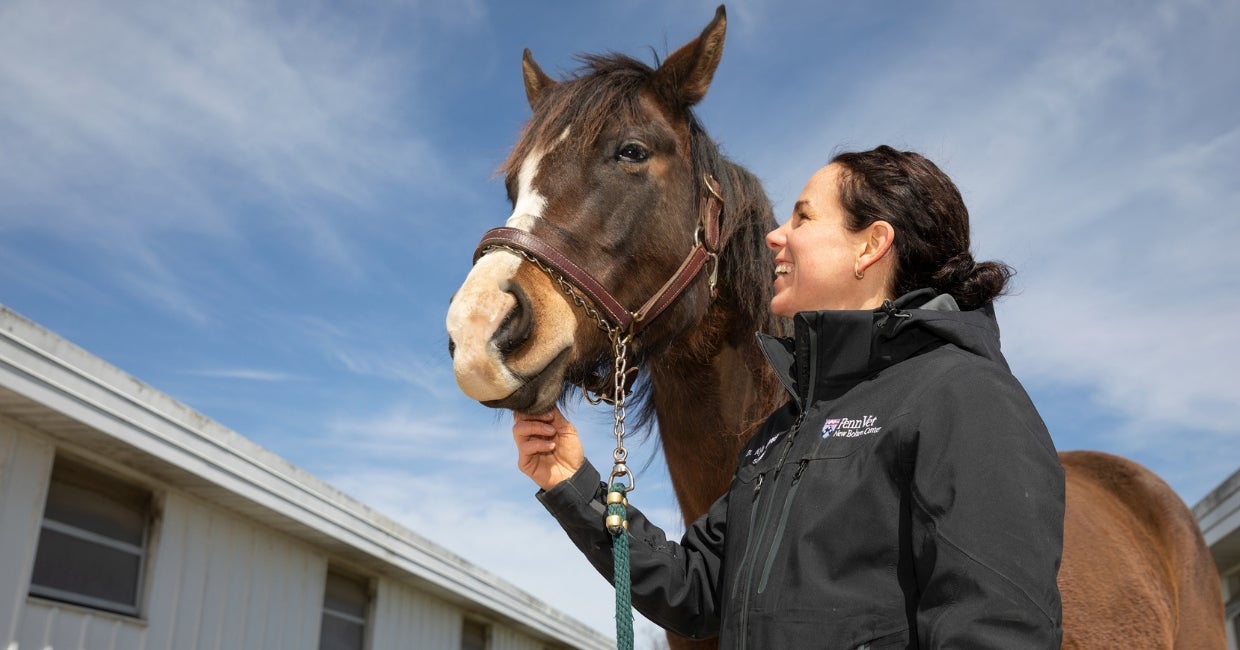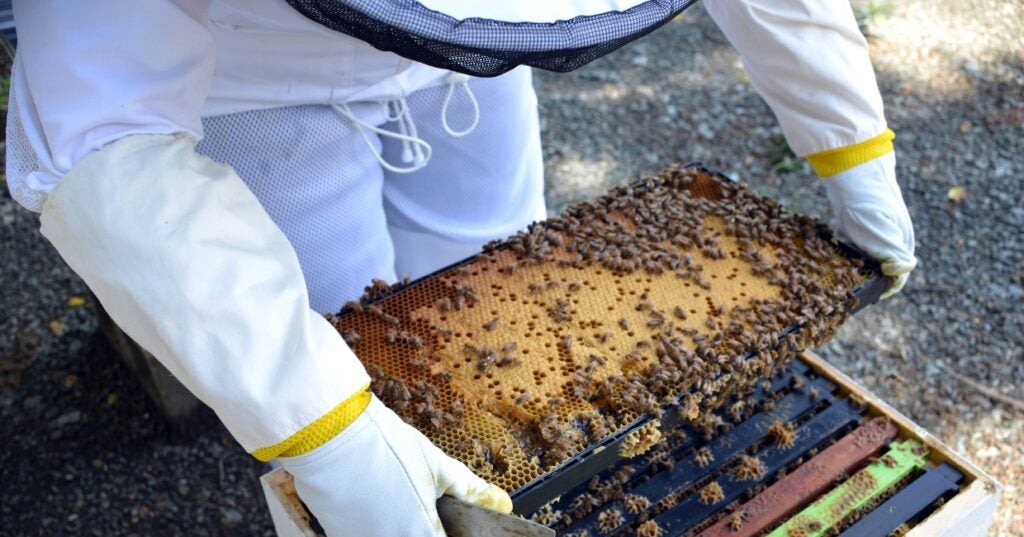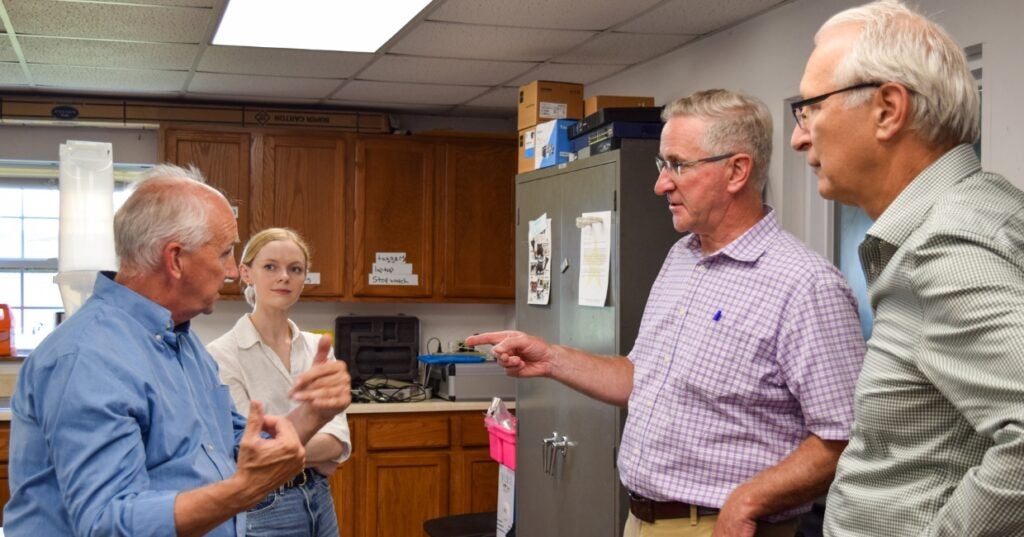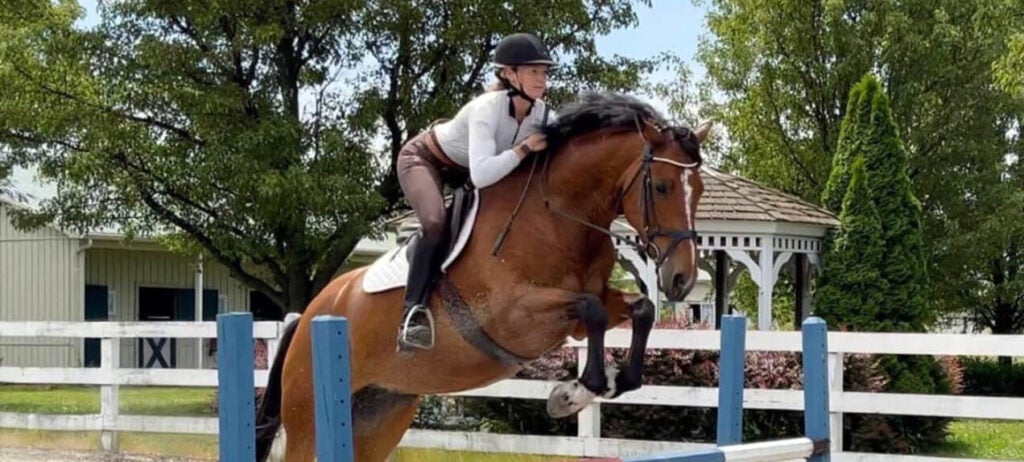Penn Vet Equine Orthopedic Surgeon Awarded Grant For Research to Restore Joint Health in Horses

Funding from Grayson-Jockey Club Research Foundation seeks to establish a new class of injectable compounds to improve equine joint strength and slow worsening osteoarthritis
The Jacques Jenny Endowed Chair in Orthopedic Surgery and Associate Professor of Large Animal Surgery, Kyla Ortved, DVM, PhD, DACVS, DACVSMR, at the University of Pennsylvania’s School of Veterinary Medicine (Penn Vet) has received a $205,000 grant from the Grayson-Jockey Club Research Foundation to support Ortved’s continuing translational work in understanding the occurrence, progression, and treatments of joint injury and post-traumatic osteoarthritis (PTOA) in horses. This study represents a vital step towards establishing a new class of injectable, cartilage-penetrating compounds that mimic matrix proteins called proteoglycans that disappear in osteoarthritis (OA). Proteoglycans help cartilage absorb shock and stay strong.
OA is the leading cause of lameness in horses, affecting over half of those older than 15 and up to 90% of horses over 30. The hallmark of OA is pain, decreased range of motion, and swollen joints. In severe OA cases, permanent loss of joint function can lead to the retirement of equine athletes or euthanasia. While there are treatments to temporarily reduce inflammation and OA-induced pain, there are no effective disease-modifying OA drugs available to halt or reverse OA. There is a compelling need to initiate novel approaches that directly address the loss of proteoglycans, and repair and reverse the deterioration of articular cartilage, the connective tissue that covers the ends of bones in joints.
“Equine joint cartilage is incredibly tough, but it can get damaged, especially in equine athletes. This damage often leads to OA where joints lose their ability to properly function,” said Ortved. “This new injectable joint therapy has the potential to not only strengthen damaged cartilage, but also to stay where it is needed, which has always been a challenge in treating OA. Our aim is to stop the disease from progressing and to restore joint function.”
To address the loss of proteoglycans, Ortved is working with her collaborator, Charles Dhong, PhD, Assistant Professor of Material Science and Biomedical Engineering at the University of Delaware, who has developed a synthetic treatment that simulates these lost proteins. It is a liquid, so it spreads easily into the joint. Once it warms to body temperature, it turns into a gel and stays in place—plugging holes in damaged cartilage. This novel approach could vastly improve joint strength and slow down or even prevent the worsening of OA. Ortved and her team of investigators plan to evaluate it in horses to see how well it works and how long it lasts, with the goal of creating a long-lasting, injectable treatment for joint damage.
“Our goal is to give horses and equine athletes the opportunity for long and healthy careers,” said Ortved. “The insights we gain from this study could also open the door to similar breakthroughs in human medicine, improving joint health and quality of life for people suffering from OA.”
Ortved earned her DVM from the University of Guelph and completed her large animal surgical residency at Cornell University, where she also earned her PhD in gene therapy for equine cartilage repair. She is a 2011 Diplomate of the American College of Veterinary Surgeons (ACVS) and a 2016 Diplomate of the American College of Veterinary Sports Medicine and Rehabilitation. Ortved joined Penn Vet’s Department of Clinical Studies at New Bolton Center in 2016, and she is the primary investigator of the Ortved Orthopedic Regenerative Medicine Laboratory. She has published nearly 70 peer-reviewed research papers and is the senior author of 32 of them.
The grant was awarded through the Grayson-Jockey Club Foundation (GJCF), which fosters veterinary research at universities throughout North America. The slate of GJCF’s spring 2025 awards funded 16 new projects and 10 continuing projects at 17 universities. Since 1940, GJCF has provided over $44.4 million to support more than 450 projects at 48 universities.
Related News

A New Penn Vet Study Aims to Shed Light on Honeybees’ Foraging Habits, with an Eye Toward Aiding their Survival
A new study recently underway at the University of Pennsylvania School of Veterinary Medicine’s (Penn Vet) New Bolton Center, led by Associate Professor of Epidemiology Laurel Redding, aims to shed…

Penn Vet professor Thomas Parsons and Philadelphia-based tech firm AgriGates receive inaugural state innovation grants
A professor at the University of Pennsylvania’s School of Veterinary Medicine (Penn Vet) who has pioneered a more efficient, humane way to feed mother pigs and a Philadelphia firm that…

Emmie’s Complex Case Takes Curiosity, Collaboration, and Care
A warmblood named Emmie receives a layered, individualized treatment plan at New Bolton Center for her complex health issues.
About Penn Vet
Ranked among the top ten veterinary schools worldwide, the University of Pennsylvania School of Veterinary Medicine (Penn Vet) is a global leader in veterinary education, research, and clinical care. Founded in 1884, Penn Vet is the first veterinary school developed in association with a medical school. The school is a proud member of the One Health initiative, linking human, animal, and environmental health.
Penn Vet serves a diverse population of animals at its two campuses, which include extensive diagnostic and research laboratories. Ryan Hospital in Philadelphia provides care for dogs, cats, and other domestic/companion animals, handling more than 34,600 patient visits a year. New Bolton Center, Penn Vet’s large-animal hospital on nearly 700 acres in rural Kennett Square, PA, cares for horses and livestock/farm animals. The hospital handles more than 6,200 patient visits a year, while our Field Services have gone out on more than 5,500 farm service calls, treating some 18,700 patients at local farms. In addition, New Bolton Center’s campus includes a swine center, working dairy, and poultry unit that provide valuable research for the agriculture industry.

